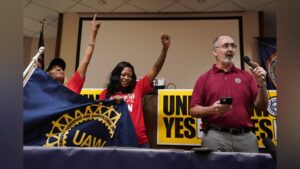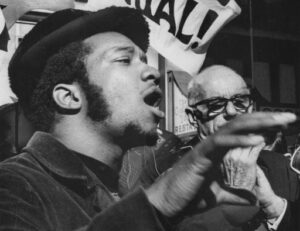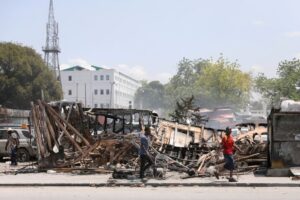In a December 3, 2001, cover story, Time asked about Afghan women: “How much better will their lives be now?” Spoiler: not very much better.
Just as US corporate news media “discovered” Afghan women’s rights only when the US was angling for invasion, their since-forgotten interest returned with a vengeance as US troops exited the country.
After September 11, 2001, the public was subjected to widespread US news coverage of burqa-clad Afghan women in need of US liberation, and celebratory reports after the invasion. Time magazine (11/26/01), for instance, declared that “the greatest pageant of mass liberation since the fight for suffrage” was occurring, as “female faces, shy and bright, emerged from the dark cellars” to stomp on their old veils. In a piece by Nancy Gibbs headlined “Blood and Joy,” the magazine told readers this was “a holiday gift, a reminder of reasons the war was worth fighting beyond those of basic self-defense” (FAIR.org, 4/9/21).
The media interest was highly opportunistic. Between January 2000 and September 11, 2001, there were 15 US newspaper articles and 33 broadcast TV reports about women’s rights in Afghanistan. In the 16 weeks between September 12 and January 1, 2002, those numbers skyrocketed to 93 and 628, before plummeting once again (Media, Culture & Society, 9/1/05).
Suddenly remembering women
Now, as the US finally is withdrawing its last troops, many corporate media commentators put women and girls at the center of the analysis, as when Wolf Blitzer (CNN Situation Room, 8/16/21), after referring to “the horror awaiting women and girls in Afghanistan,” reported:
President Biden saying he stands, and I’m quoting him now, squarely, squarely behind this decision to withdraw US forces from Afghanistan, despite the shocking scene of chaos and desperation as the country fell in a matter of only a few hours under Taliban control, and the group’s extremist ideology has tremendous and extremely disturbing implications for everyone in Afghanistan, but especially the women and girls.
This type of framing teed up hawkish guests, who proliferate on TV guest lists, to use women as a political football to oppose withdrawal. Blitzer guest Rep. Adam Kinzinger (R.-Illinois), for instance, argued:
Look at the freedom that is being deprived from the Afghan people as the Taliban move into Afghan, or moving into parts of Afghanistan now, and you know how much freedom they had. Look at the number of women that are out there making careers, that are thought leaders, that are academics, that never would have happened under the Taliban leadership…. The devastation you are seeing today is why that small footprint of 2,500 US troops was so important.
Sen. Joni Ernst (R.-Iowa) gladly gave Jake Tapper (CNN Newsroom, 8/16/21) her take on the situation after CNN aired a report on the situation for women:
As you mentioned, for women and younger girls, this is also very devastating for them. The humiliation that they will endure at the hands of the Taliban all around this is just a horrible, horrible mar on the United States under President Joe Biden.
‘America rescued them’
Such analysis depends on the assumption that the US invasion and occupation “saved” Afghan women. In the Wall Street Journal (8/17/21), an op-ed by former George W. Bush staffer Charity Wallace ran under the headline : “The Nightmare Resumes for Afghan Women: America Rescued Them 20 Years Ago. How Can We Abandon Them to the Taliban Again?”
Two days later, a news article in the Journal (8/19/21) about the fate of women in Afghanistan explained: “Following the 2001 invasion, US and allied forces invested heavily to promote gender equality.”
The Associated Press (8/14/21), in a piece headlined, “Longest War: Were America’s Decades in Afghanistan Worth It?,” noted at the end that “some Afghans—asked that question before the Taliban’s stunning sweep last week—respond that it’s more than time for Americans to let Afghans handle their own affairs.” It continued, “But one 21-year-old woman, Shogufa, says American troops’ two decades on the ground meant all the difference for her.” After describing Shogufa’s experience for five paragraphs, the piece concludes with her “message to Americans”:
“Thank you for everything you have done in Afghanistan,” she said, in good but imperfect English. “The other thing was to request that they stay with us.”
Courtesy Fairness and Accuracy in Reporting (FAIR)
Julie Hollar is FAIR’s senior analyst and managing editor. Julie has a Ph.D. in Political Science from the Graduate Center of the City University of New York.




